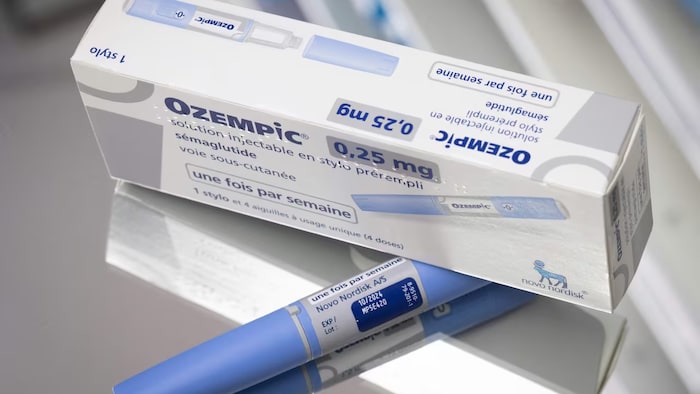Open in full screen mode The antidiabetic drug Ozempic is manufactured by the Danish pharmaceutical company Novo Nordisk. On TikTok, the hashtag #Ozempic has reached more than 500 million views. The drug was made popular for its weight-loss properties. Speech synthesis, based on artificial intelligence, makes it possible to generate spoken text from written text. The US Food and Drug Administration (FDA) says it is looking into reports of hair loss and suicidal thoughts in people using Ozempic, Mounjaro and Wegovy, popular diabetes and weight loss medications. /p> In its quarterly report (New window) published Tuesday, the FDA said it was assessing the need to further regulate the use of these drugs, made popular by their weight-loss properties, after receiving several reports through its notification system. of adverse events (FAERS). Hair loss, pulmonary aspiration or accidental inhalation of food or liquid and suicidal ideation are among the effects that will be analyzed by the US agency to determine whether intervention is necessary. From January to September 2023, the FDA says it received 201 reports of suicidal thoughts; 422 reports of alopecia; and 18 reports of pulmonary aspiration during surgery. The appearance of a drug on this list does not mean that the FDA has concluded that the drug presents these risks, specifies the FAERS website. This means that the FDA has identified a potential safety issue, but has not identified whether there is a causal relationship between the drug and the listed risks. Loading ELSE ON NEWS: School shooting secondary school in Iowa leaves one dead and five injured These side effects were not entirely unknown to the authorities. According to data published in the New England Medical Journal(New window), about 10% of people taking semaglutide (one of several agonists of the reference substance called GLP-1) have reported side effects, most of them stomach effects (nausea, diarrhea, vomiting, paralysis stomach, pancreatitis and intestinal obstructions). To date, various studies show that the risks of serious side effects are generally rare . On the other hand, it should be noted that Health Canada, the European Medicines Agency (New window) (EMA) and the British Medicines Regulatory Agency medicines and products (New window) have been carrying out data evaluations for several months relating to the risk of suicidal thoughts, self-harm and suicide in connection with the use of GLP-1 agonists. So far, the European regulator says no conclusions can be drawn on a causal link between the drugs and thoughts of self-harm, but must still discuss the subject at a next meeting in April. Moreover, certain anesthesiologists had issued a warning in theCanadian Journal of Anesthesia(New window) after observing an increasing number of cases of pulmonary aspiration during surgery with anesthesia in patients taking GLP-1 receptor agonists. That's why the American Society of Anesthesiologists recommends (New window) that people who use GLP-1 agonists stop taking them a week before surgery to reduce the risk regurgitation and pneumonia. The European Agency is also investigating the increased risks of thyroid cancer (New window). Studies show that semaglutide (one of the GLP-1 agonists) causes thyroid tumors in rodents; its effects on humans are unknown. This is why the FDA does not recommend this medication for people with a family history of thyroid cancer. Novo Nordisk, which makes several GLP-1 agonists, said in a statement Wednesday that patient safety is its priority. The company said it is aware of these side effects and is working closely with the FDA. Novo Nordisk guarantees the safety and effectiveness of all our GLP-1 medications when used as directed and when taken under the supervision of a healthcare professional. health. Remember that most GLP-1 agonists are not authorized to cause weight loss. Yet the frenzy surrounding their weight-loss effect has caused a global shortage of these drugs. Health Canada indicates that shortages of Ozempic, Trulicity and Mounjaro are likely to continue at least until the end of March 2024. Pharmaceutical companies have also asked pharmacists to limit prescription renewals to a duration of 30 days and prescribe these medications only to those who need them to manage their diabetes.
Iowa high school shooting leaves one dead, five injured
Ozempic, Mounjaro, Wegovy: cases examined by the FDA

